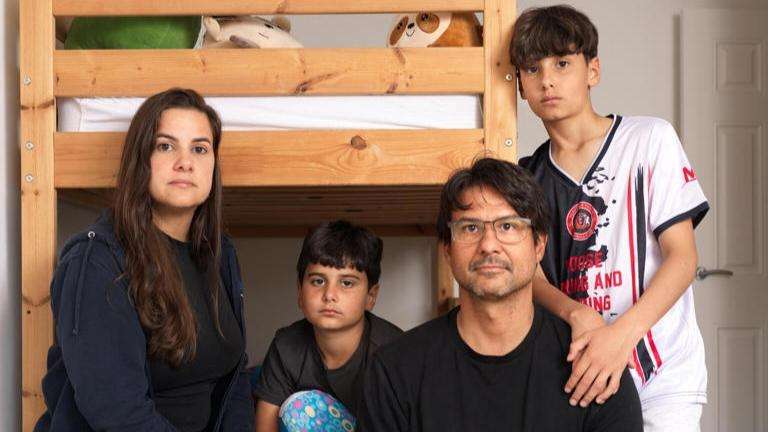[caption id="attachment_5804" align="alignleft" width="1024"]
 Fred and Andrea Gabales work at a care home in Methil, Fife
Fred and Andrea Gabales work at a care home in Methil, Fife[/caption]
Leaders in Scotland's care industry are calling new plans to reduce net migration "cruel" and "catastrophic."
The new regulations went into effect on Monday and prohibit overseas caregivers from traveling with family members.
In the past, the Health and Care Worker visa permitted entrance into the UK for children and dependents.
The UK government claims that it will put an end to systemic abuse, but with about 15% of the workforce being foreign-born, the strategy has been called "hostile, xenophobic," and it will simply exacerbate an already troubled industry.
The Gabales family fell in love with Scotland four years ago when they moved to Fife from the Philippines.
Fred arrived first, landing a position in Methil, Fife as a care home nurse; his wife and kid followed soon after.
But from Monday, that will no longer be possible as new immigration rules come into force – banning all overseas care workers from bringing dependants with them on their visa.
He said: “I applied because of the salary, better opportunities and life for my family.
“While we respect the decision the government makes, I feel quite disappointed. “Nurses coming here will think twice to come over here because of that. If you’re a family-oriented man, family unity will be your priority.
“I think fewer people will apply, which is problematic nowadays.
“If you have family, you have to consider other options like Canada, Australia or US. There are better opportunities for the whole family.”
Andrea now works at the same care home as Fred, but warns the changes will badly impact a sector struggling for staff.
She said: “It’s really sad to hear. I was in a situation where my husband worked far away from me and my son. The only communication we had was by phone and video call.
“Coming home from work after such long hours feels different knowing your family is there waiting for you.
“When you go to work, you have a feeling of being excited to work because you’re inspired.
“It would be so hard for me as a mum. I want to be present in every special occasion. I don’t think I could do it.
She added: “I think there will be fewer workers coming to the UK. There will be fewer people filling in the gaps in the care sector.”
The changes are part of the UK Government’s plans to slash net migration.
As of September last year, 101,000 Health and Care Worker Visas were granted, with around 120,000 Dependant Visas going to family members.
Chief executive of Scottish Care Donald MacAskill said between 10-15% of Scotland’s care sector come from international communities.
He said: “It could have a potentially devastating impact. We’ve struggled to recruit and retain our care workforce. In order to do that we’ve been supported by migration into country.
“We have skilled and talented people coming to Scotland and making this place their home. “This is a very hostile approach based on a hostile model of migration.
“What it says is, ‘we want you to come and care for our children and older adults, but we don’t want you to have own life or treat you with dignity and respect.’ It’s a horrid example of xenophobic hostile immigration. “We dare not and we cannot lose these women and men.”
Those specialising in international recruitment say although they don’t agree with the changes, it wont stem the flow of willing workers.
Care International co-founder Melvin Byres said: “The reality is there are plenty of others who will come over. The sector will still find the talent it needs.
“There are not enough nurses in the western world but every place has their pros and cons. This makes Britain slightly less attractive but it doesn’t mean thousands are going to look elsewhere.
“Clients have experienced huge delays with the Home Office’s processing of sponsorship.
“We believe the Home Office are waiting for the new rules to come into play at which point we think the bottleneck will be removed.”
“The reality is the care sector is still desperate for foreign workers. They are crucial.”
The Home Office has been contacted for comment.
 Fred and Andrea Gabales work at a care home in Methil, Fife[/caption]
Leaders in Scotland's care industry are calling new plans to reduce net migration "cruel" and "catastrophic."
The new regulations went into effect on Monday and prohibit overseas caregivers from traveling with family members.
In the past, the Health and Care Worker visa permitted entrance into the UK for children and dependents.
The UK government claims that it will put an end to systemic abuse, but with about 15% of the workforce being foreign-born, the strategy has been called "hostile, xenophobic," and it will simply exacerbate an already troubled industry.
The Gabales family fell in love with Scotland four years ago when they moved to Fife from the Philippines.
Fred arrived first, landing a position in Methil, Fife as a care home nurse; his wife and kid followed soon after.
But from Monday, that will no longer be possible as new immigration rules come into force – banning all overseas care workers from bringing dependants with them on their visa.
He said: “I applied because of the salary, better opportunities and life for my family.
“While we respect the decision the government makes, I feel quite disappointed. “Nurses coming here will think twice to come over here because of that. If you’re a family-oriented man, family unity will be your priority.
“I think fewer people will apply, which is problematic nowadays.
“If you have family, you have to consider other options like Canada, Australia or US. There are better opportunities for the whole family.”
Andrea now works at the same care home as Fred, but warns the changes will badly impact a sector struggling for staff.
She said: “It’s really sad to hear. I was in a situation where my husband worked far away from me and my son. The only communication we had was by phone and video call.
“Coming home from work after such long hours feels different knowing your family is there waiting for you.
“When you go to work, you have a feeling of being excited to work because you’re inspired.
“It would be so hard for me as a mum. I want to be present in every special occasion. I don’t think I could do it.
She added: “I think there will be fewer workers coming to the UK. There will be fewer people filling in the gaps in the care sector.”
The changes are part of the UK Government’s plans to slash net migration.
As of September last year, 101,000 Health and Care Worker Visas were granted, with around 120,000 Dependant Visas going to family members.
Chief executive of Scottish Care Donald MacAskill said between 10-15% of Scotland’s care sector come from international communities.
He said: “It could have a potentially devastating impact. We’ve struggled to recruit and retain our care workforce. In order to do that we’ve been supported by migration into country.
“We have skilled and talented people coming to Scotland and making this place their home. “This is a very hostile approach based on a hostile model of migration.
“What it says is, ‘we want you to come and care for our children and older adults, but we don’t want you to have own life or treat you with dignity and respect.’ It’s a horrid example of xenophobic hostile immigration. “We dare not and we cannot lose these women and men.”
Those specialising in international recruitment say although they don’t agree with the changes, it wont stem the flow of willing workers.
Care International co-founder Melvin Byres said: “The reality is there are plenty of others who will come over. The sector will still find the talent it needs.
“There are not enough nurses in the western world but every place has their pros and cons. This makes Britain slightly less attractive but it doesn’t mean thousands are going to look elsewhere.
“Clients have experienced huge delays with the Home Office’s processing of sponsorship.
“We believe the Home Office are waiting for the new rules to come into play at which point we think the bottleneck will be removed.”
“The reality is the care sector is still desperate for foreign workers. They are crucial.”
The Home Office has been contacted for comment.
Fred and Andrea Gabales work at a care home in Methil, Fife[/caption]
Leaders in Scotland's care industry are calling new plans to reduce net migration "cruel" and "catastrophic."
The new regulations went into effect on Monday and prohibit overseas caregivers from traveling with family members.
In the past, the Health and Care Worker visa permitted entrance into the UK for children and dependents.
The UK government claims that it will put an end to systemic abuse, but with about 15% of the workforce being foreign-born, the strategy has been called "hostile, xenophobic," and it will simply exacerbate an already troubled industry.
The Gabales family fell in love with Scotland four years ago when they moved to Fife from the Philippines.
Fred arrived first, landing a position in Methil, Fife as a care home nurse; his wife and kid followed soon after.
But from Monday, that will no longer be possible as new immigration rules come into force – banning all overseas care workers from bringing dependants with them on their visa.
He said: “I applied because of the salary, better opportunities and life for my family.
“While we respect the decision the government makes, I feel quite disappointed. “Nurses coming here will think twice to come over here because of that. If you’re a family-oriented man, family unity will be your priority.
“I think fewer people will apply, which is problematic nowadays.
“If you have family, you have to consider other options like Canada, Australia or US. There are better opportunities for the whole family.”
Andrea now works at the same care home as Fred, but warns the changes will badly impact a sector struggling for staff.
She said: “It’s really sad to hear. I was in a situation where my husband worked far away from me and my son. The only communication we had was by phone and video call.
“Coming home from work after such long hours feels different knowing your family is there waiting for you.
“When you go to work, you have a feeling of being excited to work because you’re inspired.
“It would be so hard for me as a mum. I want to be present in every special occasion. I don’t think I could do it.
She added: “I think there will be fewer workers coming to the UK. There will be fewer people filling in the gaps in the care sector.”
The changes are part of the UK Government’s plans to slash net migration.
As of September last year, 101,000 Health and Care Worker Visas were granted, with around 120,000 Dependant Visas going to family members.
Chief executive of Scottish Care Donald MacAskill said between 10-15% of Scotland’s care sector come from international communities.
He said: “It could have a potentially devastating impact. We’ve struggled to recruit and retain our care workforce. In order to do that we’ve been supported by migration into country.
“We have skilled and talented people coming to Scotland and making this place their home. “This is a very hostile approach based on a hostile model of migration.
“What it says is, ‘we want you to come and care for our children and older adults, but we don’t want you to have own life or treat you with dignity and respect.’ It’s a horrid example of xenophobic hostile immigration. “We dare not and we cannot lose these women and men.”
Those specialising in international recruitment say although they don’t agree with the changes, it wont stem the flow of willing workers.
Care International co-founder Melvin Byres said: “The reality is there are plenty of others who will come over. The sector will still find the talent it needs.
“There are not enough nurses in the western world but every place has their pros and cons. This makes Britain slightly less attractive but it doesn’t mean thousands are going to look elsewhere.
“Clients have experienced huge delays with the Home Office’s processing of sponsorship.
“We believe the Home Office are waiting for the new rules to come into play at which point we think the bottleneck will be removed.”
“The reality is the care sector is still desperate for foreign workers. They are crucial.”
The Home Office has been contacted for comment.

.jpg)





.svg)

